外研版英语必修二 Module 4 Fine Arts — Western Chinese and Pop Arts Grammar动名词及不定式作主语(共48张PPT)
文档属性
| 名称 | 外研版英语必修二 Module 4 Fine Arts — Western Chinese and Pop Arts Grammar动名词及不定式作主语(共48张PPT) |

|
|
| 格式 | zip | ||
| 文件大小 | 1021.9KB | ||
| 资源类型 | 教案 | ||
| 版本资源 | 外研版 | ||
| 科目 | 英语 | ||
| 更新时间 | 2019-01-21 00:00:00 | ||
图片预览

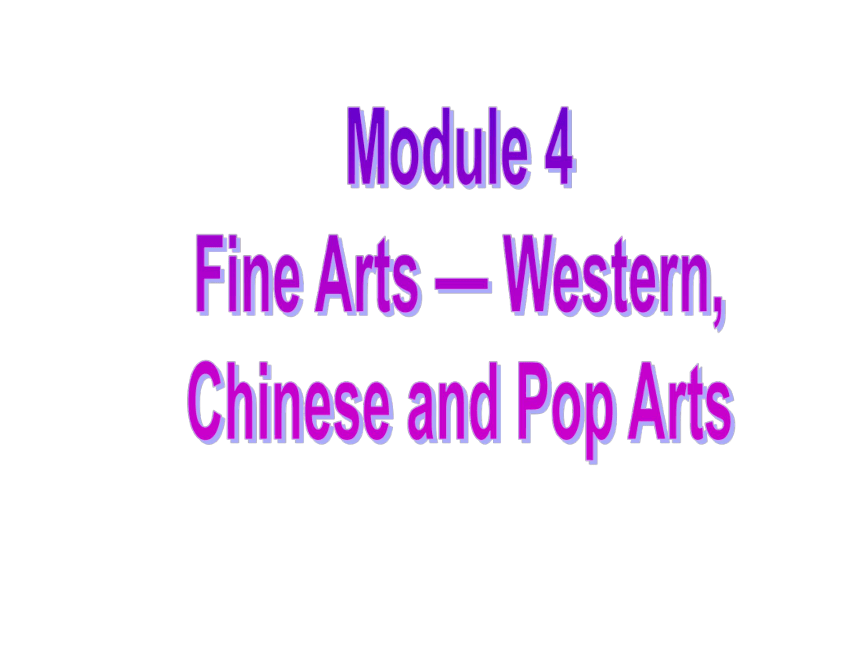
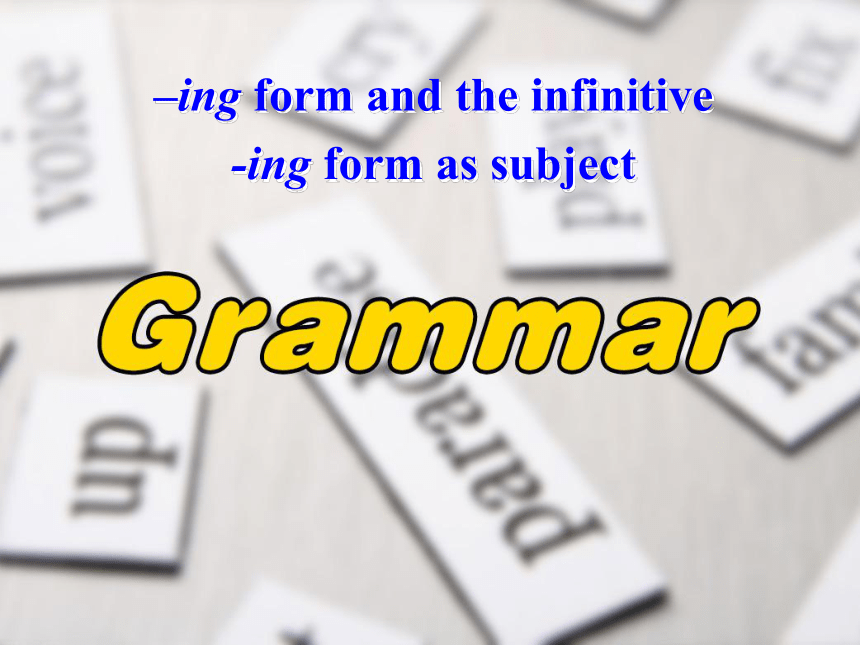
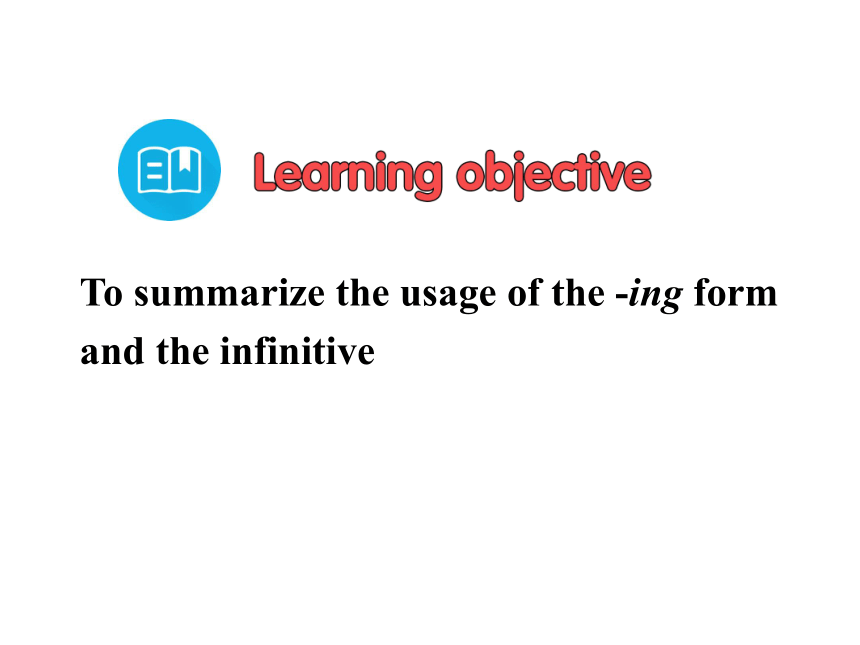
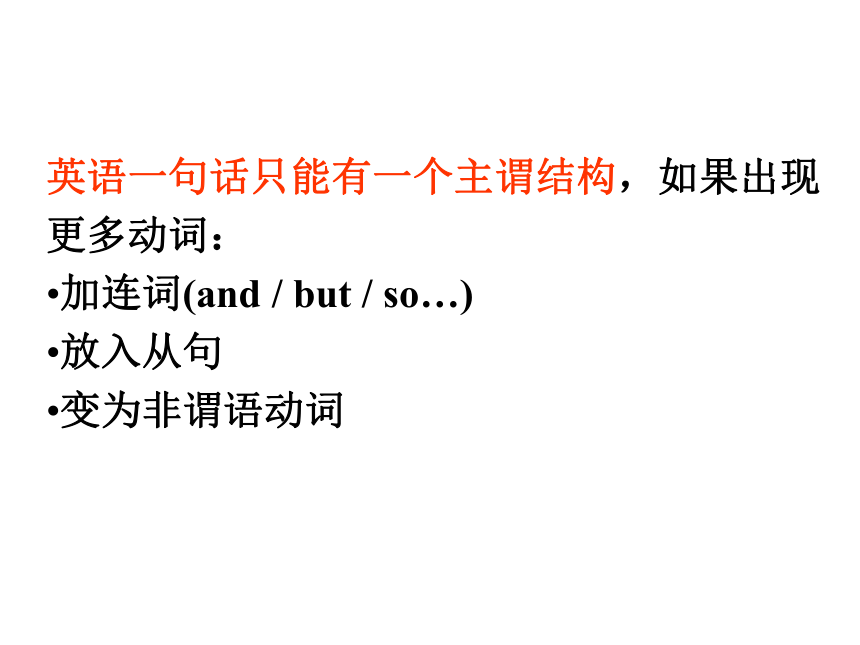
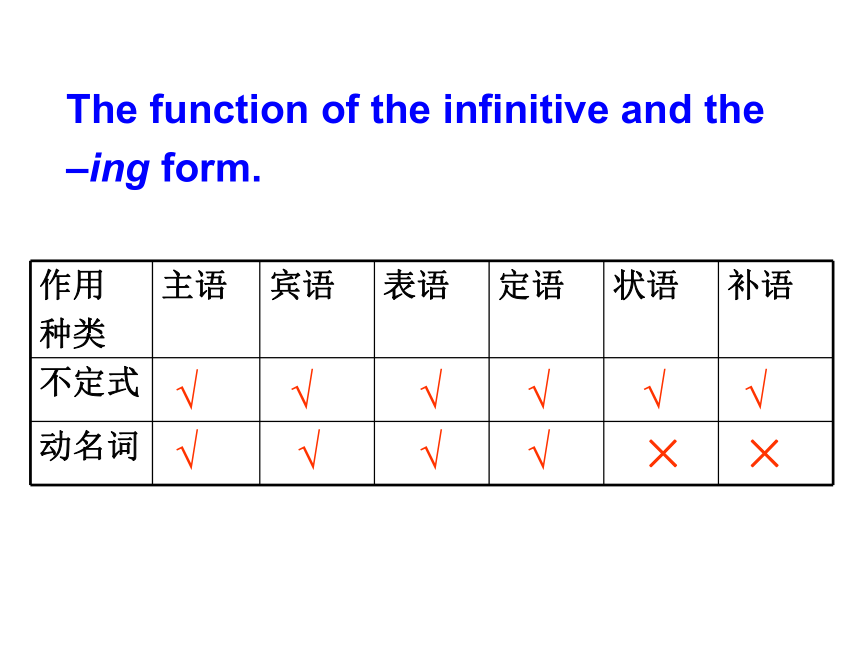
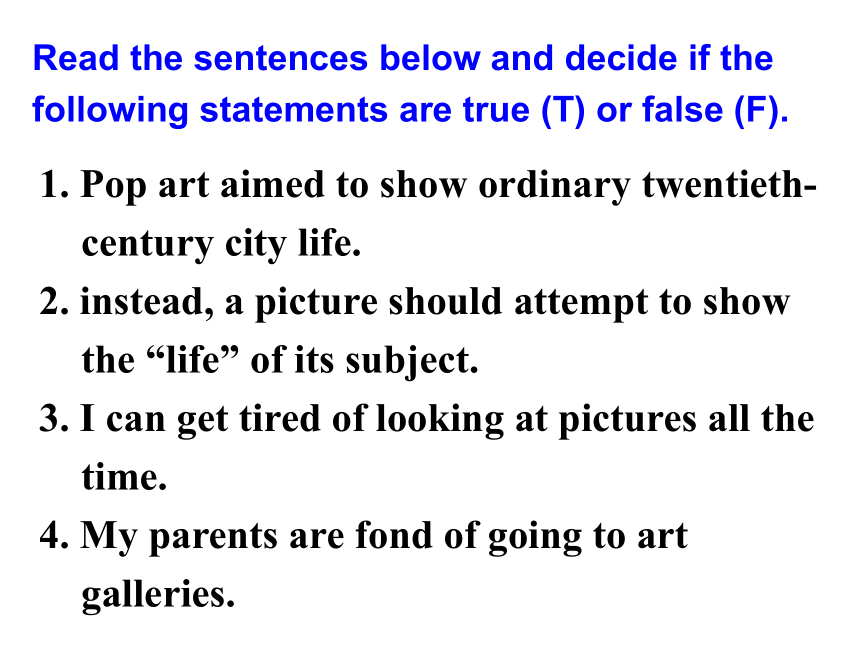
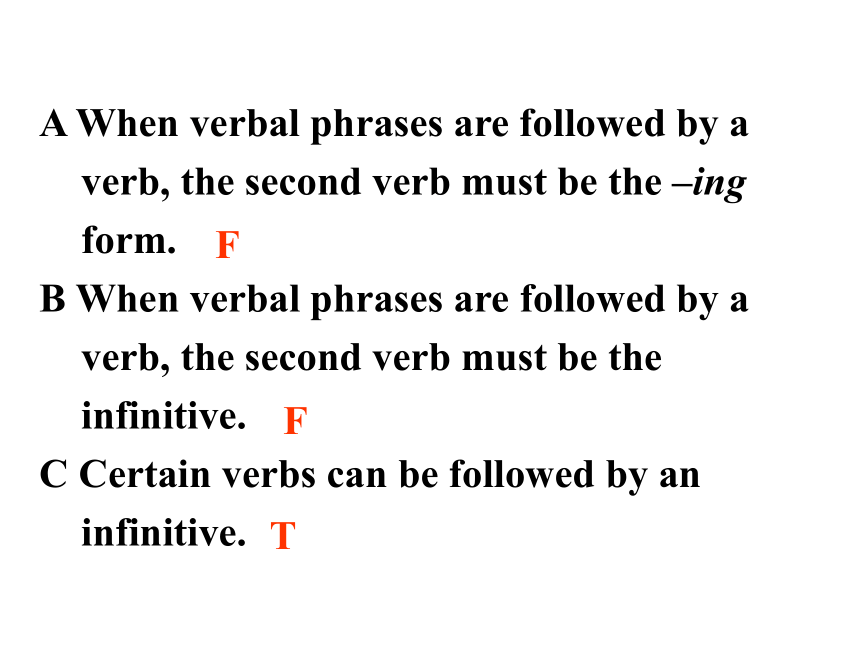


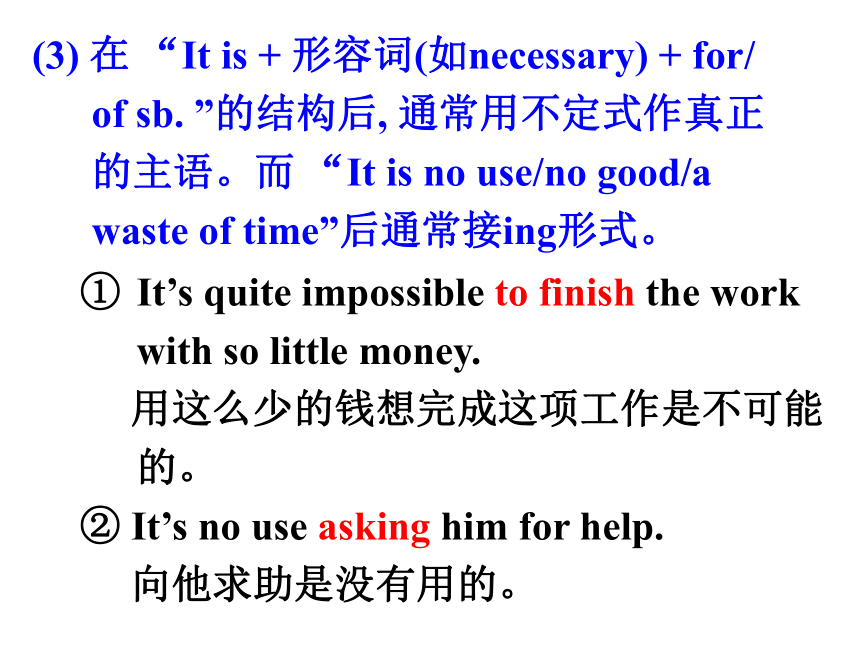

文档简介
课件48张PPT。 外研版
高一年级 (必修2) Module 4
Fine Arts — Western,
Chinese and Pop Arts–ing form and the infinitive
-ing form as subjectTo summarize the usage of the -ing form and the infinitive英语一句话只能有一个主谓结构,如果出现更多动词:
加连词(and / but / so…)
放入从句
变为非谓语动词The fun_ction of the infinitive and the
–ing form.√√√√√√√√√√××Read the sentences below and decide if the following statements are true (T) or false (F).1. Pop art aimed to show ordinary twentieth-century city life.
2. instead, a picture should attempt to show the “life” of its subject.
3. I can get tired of looking at pictures all the time.
4. My parents are fond of going to art galleries.A When verbal phrases are followed by a verb, the second verb must be the –ing form.
B When verbal phrases are followed by a verb, the second verb must be the infinitive.
C Certain verbs can be followed by an infinitive.FFT (1) -ing形式和不定式都可在句中用作主语。一般情况下可以互换。
To learn a foreign language is not easy.
= Learning a foreign language is not easy.
学习外语是不容易的。1.作主语(2) 表示具体的, 特定情况下的或有待于完成的动作时, 常用不定式。
① To finish such a novel will take me
several days.
读完这本小说需要花去我几天的时间。② It’s impossible to get to Beijing in three hours this time, because there is something wrong with our car.
看来这次三个小时是到不了北京了, 因为我们的车出问题了。(3) 在 “It is + 形容词(如necessary) + for/ of sb. ”的结构后, 通常用不定式作真正的主语。而 “It is no use/no good/a waste of time”后通常接ing形式。It’s quite impossible to finish the work with so little money.
用这么少的钱想完成这项工作是不可能的。
② It’s no use asking him for help.
向他求助是没有用的。(4) There is no结构后只能接-ing形式
There is no knowing whether he is dead or alive.
无从得知他是死是活。(1) 两者都可用作表语, 而且一般情况下可以互换。
His work is to paint houses.
= His work is painting houses.
他的工作就是粉刷房屋。2.作表语(2) 表示具体的、 特定情况下的、将来的动作, 通常用动词不定式。
Our homework today is to finish the exercises 2 and 3 on page 10.
我们今天的作业就是完成第10页的练习2和3。(3) 主语与表语通常要保持形式一致。
To see is to believe. = Seeing is
believing.
眼见为实。(1) 有些动词后面只能用不定式作宾语,常见此类动词有:
ask, agree, beg, decide, determine, fail, hope, learn, manage, offer, plan, prepare, pretend, promise, refuse, set out, want, wish, expect, demand3.作宾语① She decided to help him.
她决定帮他。
② As a student, he can’t afford to buy a car now.
作为一个学生,他现在买不起车。
③ Though he was very busy, he managed to take time to attend the wedding. 虽然他很忙,还是参加了那个婚礼。(2) 有些动词后只能接ing形式作宾语,
常见此类动词有:
admit, advise, appreciate, avoid, can’t help, consider(考虑), delay, deny, endure, enjoy, excuse, escape, face, fancy, finish, forgive, give up, imagine, keep, keep on, mind, miss, mention, pardon, permit, practise, put off, risk, resist, suggest, understand等。① The doctor advised taking more
exercise.
医生建议多做运动。
② I suggest doing it in this way. 我建议这样做。注意: 一些动词短语中含有介词to, 不要和不定式中的to混淆。常见此类短语:
be used to, come to, devote to, get down to, lead to, look forward to, pay attention to, refer to, stick to等。① I really must get down to considering it seriously.
我真的必须认真考虑一下这事了。
② We are looking forward to seeing you again.
我们盼望着再次见到你。(3) 有些动词后既可接-ing形式, 也可接不定式, 且意义上没有差别。常见此类动词: can’t stand, prefer, learn, continue等。
① I can’t stand seeing/to see good food going to waste.
我无法忍受看到好好的粮食被浪费掉。
② She continue to work/working after
having a baby.
有了孩子后她仍然继续工作。(4) begin, start后跟不定式或动词-ing形式皆可, 通常可以互换, 但在下列情况下, 只用不定式。
1) start, begin本身为进行时态时。
The boy noticed his father was beginning to get angry, so he ran away.
那个小男孩注意到他的父亲开始生气了, 所以就跑开了。2) 当主语为非生物名词或it时。
A strong wind started to blow.
一阵强风开始刮起来。
3) 当其后接表示心理活动的词时, 如understand, realize, know, see等。
He began to realize the importance of foreign languages.
他开始意识到外语的重要性。4) 在hate, like, love后, 表示经常性, 习惯性的动词时, 通常用动词-ing形式; 表示特定的、具体的某次行为则用不定式。
① I don’t like bothering him when he is
busy.
我不喜欢在他忙得时候打扰他。② I usually like staying with him, but I even hate to see him that night. 我通常喜欢和他在一起,但是那天晚上我甚至不想见到他。(5) 在remember, forget, try, go on, regret, mean, stop, want, need, require等动词后既可接动词-ing形式, 也可接不定式, 但含义不同。
1) remember to do记着去做(还没有
做的事)
remember doing记得做过某事2) forget to do 忘记要去做某事
forget doing 忘记了做的事
3) go on to do 继续做另一件事
go on doing 继续做(原来做的)同一件事
4) regret to do 遗憾将要做某事
regret doing 后悔做过某事
5) mean to do 打算做某事
mean doing 意味着做某事6) stop to do 停止(正在做的事)去做另一件
stop doing 停止正在做的事
7) try to do 努力做某事
try doing 尝试着做某事
8) want to do 想要做某事
want doing 需要被
9) need/require to do 需要做某事
need/require doing 需要被① Please remember to turn off the light when you leave.
离开时请记着关灯。
② Certainly I posted your letter—I remember posting it.
我当然给你寄信了, 我记得寄过它。
③ The machine needs cleaning. (needs to be cleaned).
这台机器需要清洁了。(1) 常见用不定式作宾补的动词:
allow, help, warn, ask, force, tell,
expect, promise, wish, want。
① We expected him to win an Olympic
gold medal.
我们期盼他赢一枚奥运金牌。
② Tell him to come early.
告诉他早点来。4.作宾补(2) 不定式(不带to)和动词-ing形式都可在感官动词和使役动词(feel, make, let, see, hear, watch, listen to, look at, notice, observe)后作宾补。不定式强调动作发生了, 完成了; -ing形式则强调动作正在进行。① I saw a man walk into the garden
and pick some flowers.
我看到一个男的进入花园, 摘了一
些花。(进园摘花的动作已完成)② I saw a man walking into the garden.
我看到一个男的正在进入花园。(walk这个动作在“我看的时候”正在进行)
③ We heard him sing a song at the party.我们在晚会上听他唱了一首歌。(他唱了一首, 我们完整的听了一首。)
④ I heard him singing a song when passing his window.
经过他的窗户时,我听到他正在唱歌。
(我只听了一部分, 没有听完, 我过去后他可能还在唱)(3) 不定式在感官动词和使役动词后作宾补时,在主动语态时,不能带to, 而变为被动语态时,要加上to。
① They saw him steal Tom’s money.
他们看到他偷了汤姆的钱。
② He was seen to steal Tom’s money.
他被看到偷了汤姆的钱。不定式作状语, 通常表示目的、结果, 有
时也放在形容词、过去分词后表示原因;
-ing形式作状语时通常表示时间、原因、
条件或伴随等。
① I’ve taken some money out of the bank to buy a laptop. (目的)
为了买手提电脑, 我从银行了取了钱。5.作状语② He hurried to the school (only) to find nobody there. (结果) 他匆忙赶到学校, 却发现那儿没人。
③ I’m glad to hear that. (原因)
听到那件事我很高兴。④ Seeing the picture, he couldn’t help
thinking of those memorable days.
(时间) 看到这张照片(的时候), 他情
不自禁地想起了那些难忘的日了。⑤ Not knowing his address, we couldn’t
get in touch with him.
(原因) 不知道他的地址, 我们无法和
他取得 联系。⑥ Working hard, you will get what you want. (条件) 努力工作, 你会得到你想要的东西的。
⑦ The baby was lying in bed crying. (伴随) 婴儿在床上哭泣。Look at these verbs phrases. Match the two parts of the sentences.can’t stand crazy about tired of good at give up look forward to succeed in go on put off1 She put off
2 One student went on
3 My father has given up
4 Our teacher Mr Wu is good at
5 I’m looking forward to
6 He was tired of
7 That boy is crazy about
8 I can’t stand
9 The man succeeded in1) g 2) h 3) c 4) a(i) 5 d (e) 6 (a) f 7 (e) I 8) b 9) (a) e explaining things clearly
showing my pictures to people until they are finished
Painting, after many years. He reads a lot, instead.
visiting the art gallery next week.
buying the famous painting.
walking round the gallery. He wanted to sit down.
completing the picture, because she didn’t like it.
talking after the teacher entered the art class.
pop art. He thinks it’s wonderful.Put the verb in bracket into the –ing form or the infinitive.1. We plan _________ more paintings this year. (buy)
2. She is looking forward to _________ art classes at her new school. (start)
3. He is attempting _________ his painting by the weekend. (finish)to buystartingto finish4. She promised __________ me around the art gallery. (take)
5. Don’t put off __________ that exhibition. (visit)to takevisitingComplete the sentences with –ing forms of these verb.draw help be able to drink spend copy1. ____________ paint well takes a long time.
2. They say that ____________ a lot of water is good for you.
3. _____________ a picture is a good way to learn to paint.Being able todrinkingCopying draw help be able to drink spend copy4. ___________ is my favourite hobby.
5. ____________ other people makes me feel good.
6. – What do you enjoy most in life?
– __________ time with good friends. It’s really good fun.Drawing Helping Spending I.?用括号内动词的正确形式填空。
1. Have you given up ________ (drink) wine before breakfast?
2. I wish _________ (send) to work in the country.
3. I couldn't imagine ________ (live) in a place like that.drinking?to be sent?living4. Tell the children not? ________ (play) on the street.
5. My new job will mean __________ (travel) all over the world.
6. I ended up ________ (spend) the night at the airport because of the heavy rain.to play?travellingspendingII. 选用方框内合适的单词并用其正确形式填空(每个单词限用一次)。
1. I'm good at ________ to people who need to be heard.
2. I enjoy ________ people with their problems.
3. They went on ________ and never stopped laughing.walk, help, manage, take, listen, worklisteninghelping?walking4. I'd like ________ as part of a team.
5. ________ risks doesn't stress me.
6. I'm not afraid of __________ large amounts of money.walk, help, manage, take, listen, workto workTakingmanagingIII.?翻译下面句子。
1.?所有公共场所禁止吸烟。?
??????
2.?汤姆突然一声不吭地走出了房间。
??
3.?试图让她改变想法是在浪费时间。?Smoking is banned in all public places.?Tom suddenly walked out of the room, without saying a word.It’s a waste of time trying to get her to change her mind.4.?你来帮我是对我很大的鼓励。???Your coming to help me is a great encouragement to me. Finish exercises 3, 4 on page 35, 36
and exercise 2 on page 37.
Finish exercises of Grammar
on pages 85-86 in the WORKBOOK.
高一年级 (必修2) Module 4
Fine Arts — Western,
Chinese and Pop Arts–ing form and the infinitive
-ing form as subjectTo summarize the usage of the -ing form and the infinitive英语一句话只能有一个主谓结构,如果出现更多动词:
加连词(and / but / so…)
放入从句
变为非谓语动词The fun_ction of the infinitive and the
–ing form.√√√√√√√√√√××Read the sentences below and decide if the following statements are true (T) or false (F).1. Pop art aimed to show ordinary twentieth-century city life.
2. instead, a picture should attempt to show the “life” of its subject.
3. I can get tired of looking at pictures all the time.
4. My parents are fond of going to art galleries.A When verbal phrases are followed by a verb, the second verb must be the –ing form.
B When verbal phrases are followed by a verb, the second verb must be the infinitive.
C Certain verbs can be followed by an infinitive.FFT (1) -ing形式和不定式都可在句中用作主语。一般情况下可以互换。
To learn a foreign language is not easy.
= Learning a foreign language is not easy.
学习外语是不容易的。1.作主语(2) 表示具体的, 特定情况下的或有待于完成的动作时, 常用不定式。
① To finish such a novel will take me
several days.
读完这本小说需要花去我几天的时间。② It’s impossible to get to Beijing in three hours this time, because there is something wrong with our car.
看来这次三个小时是到不了北京了, 因为我们的车出问题了。(3) 在 “It is + 形容词(如necessary) + for/ of sb. ”的结构后, 通常用不定式作真正的主语。而 “It is no use/no good/a waste of time”后通常接ing形式。It’s quite impossible to finish the work with so little money.
用这么少的钱想完成这项工作是不可能的。
② It’s no use asking him for help.
向他求助是没有用的。(4) There is no结构后只能接-ing形式
There is no knowing whether he is dead or alive.
无从得知他是死是活。(1) 两者都可用作表语, 而且一般情况下可以互换。
His work is to paint houses.
= His work is painting houses.
他的工作就是粉刷房屋。2.作表语(2) 表示具体的、 特定情况下的、将来的动作, 通常用动词不定式。
Our homework today is to finish the exercises 2 and 3 on page 10.
我们今天的作业就是完成第10页的练习2和3。(3) 主语与表语通常要保持形式一致。
To see is to believe. = Seeing is
believing.
眼见为实。(1) 有些动词后面只能用不定式作宾语,常见此类动词有:
ask, agree, beg, decide, determine, fail, hope, learn, manage, offer, plan, prepare, pretend, promise, refuse, set out, want, wish, expect, demand3.作宾语① She decided to help him.
她决定帮他。
② As a student, he can’t afford to buy a car now.
作为一个学生,他现在买不起车。
③ Though he was very busy, he managed to take time to attend the wedding. 虽然他很忙,还是参加了那个婚礼。(2) 有些动词后只能接ing形式作宾语,
常见此类动词有:
admit, advise, appreciate, avoid, can’t help, consider(考虑), delay, deny, endure, enjoy, excuse, escape, face, fancy, finish, forgive, give up, imagine, keep, keep on, mind, miss, mention, pardon, permit, practise, put off, risk, resist, suggest, understand等。① The doctor advised taking more
exercise.
医生建议多做运动。
② I suggest doing it in this way. 我建议这样做。注意: 一些动词短语中含有介词to, 不要和不定式中的to混淆。常见此类短语:
be used to, come to, devote to, get down to, lead to, look forward to, pay attention to, refer to, stick to等。① I really must get down to considering it seriously.
我真的必须认真考虑一下这事了。
② We are looking forward to seeing you again.
我们盼望着再次见到你。(3) 有些动词后既可接-ing形式, 也可接不定式, 且意义上没有差别。常见此类动词: can’t stand, prefer, learn, continue等。
① I can’t stand seeing/to see good food going to waste.
我无法忍受看到好好的粮食被浪费掉。
② She continue to work/working after
having a baby.
有了孩子后她仍然继续工作。(4) begin, start后跟不定式或动词-ing形式皆可, 通常可以互换, 但在下列情况下, 只用不定式。
1) start, begin本身为进行时态时。
The boy noticed his father was beginning to get angry, so he ran away.
那个小男孩注意到他的父亲开始生气了, 所以就跑开了。2) 当主语为非生物名词或it时。
A strong wind started to blow.
一阵强风开始刮起来。
3) 当其后接表示心理活动的词时, 如understand, realize, know, see等。
He began to realize the importance of foreign languages.
他开始意识到外语的重要性。4) 在hate, like, love后, 表示经常性, 习惯性的动词时, 通常用动词-ing形式; 表示特定的、具体的某次行为则用不定式。
① I don’t like bothering him when he is
busy.
我不喜欢在他忙得时候打扰他。② I usually like staying with him, but I even hate to see him that night. 我通常喜欢和他在一起,但是那天晚上我甚至不想见到他。(5) 在remember, forget, try, go on, regret, mean, stop, want, need, require等动词后既可接动词-ing形式, 也可接不定式, 但含义不同。
1) remember to do记着去做(还没有
做的事)
remember doing记得做过某事2) forget to do 忘记要去做某事
forget doing 忘记了做的事
3) go on to do 继续做另一件事
go on doing 继续做(原来做的)同一件事
4) regret to do 遗憾将要做某事
regret doing 后悔做过某事
5) mean to do 打算做某事
mean doing 意味着做某事6) stop to do 停止(正在做的事)去做另一件
stop doing 停止正在做的事
7) try to do 努力做某事
try doing 尝试着做某事
8) want to do 想要做某事
want doing 需要被
9) need/require to do 需要做某事
need/require doing 需要被① Please remember to turn off the light when you leave.
离开时请记着关灯。
② Certainly I posted your letter—I remember posting it.
我当然给你寄信了, 我记得寄过它。
③ The machine needs cleaning. (needs to be cleaned).
这台机器需要清洁了。(1) 常见用不定式作宾补的动词:
allow, help, warn, ask, force, tell,
expect, promise, wish, want。
① We expected him to win an Olympic
gold medal.
我们期盼他赢一枚奥运金牌。
② Tell him to come early.
告诉他早点来。4.作宾补(2) 不定式(不带to)和动词-ing形式都可在感官动词和使役动词(feel, make, let, see, hear, watch, listen to, look at, notice, observe)后作宾补。不定式强调动作发生了, 完成了; -ing形式则强调动作正在进行。① I saw a man walk into the garden
and pick some flowers.
我看到一个男的进入花园, 摘了一
些花。(进园摘花的动作已完成)② I saw a man walking into the garden.
我看到一个男的正在进入花园。(walk这个动作在“我看的时候”正在进行)
③ We heard him sing a song at the party.我们在晚会上听他唱了一首歌。(他唱了一首, 我们完整的听了一首。)
④ I heard him singing a song when passing his window.
经过他的窗户时,我听到他正在唱歌。
(我只听了一部分, 没有听完, 我过去后他可能还在唱)(3) 不定式在感官动词和使役动词后作宾补时,在主动语态时,不能带to, 而变为被动语态时,要加上to。
① They saw him steal Tom’s money.
他们看到他偷了汤姆的钱。
② He was seen to steal Tom’s money.
他被看到偷了汤姆的钱。不定式作状语, 通常表示目的、结果, 有
时也放在形容词、过去分词后表示原因;
-ing形式作状语时通常表示时间、原因、
条件或伴随等。
① I’ve taken some money out of the bank to buy a laptop. (目的)
为了买手提电脑, 我从银行了取了钱。5.作状语② He hurried to the school (only) to find nobody there. (结果) 他匆忙赶到学校, 却发现那儿没人。
③ I’m glad to hear that. (原因)
听到那件事我很高兴。④ Seeing the picture, he couldn’t help
thinking of those memorable days.
(时间) 看到这张照片(的时候), 他情
不自禁地想起了那些难忘的日了。⑤ Not knowing his address, we couldn’t
get in touch with him.
(原因) 不知道他的地址, 我们无法和
他取得 联系。⑥ Working hard, you will get what you want. (条件) 努力工作, 你会得到你想要的东西的。
⑦ The baby was lying in bed crying. (伴随) 婴儿在床上哭泣。Look at these verbs phrases. Match the two parts of the sentences.can’t stand crazy about tired of good at give up look forward to succeed in go on put off1 She put off
2 One student went on
3 My father has given up
4 Our teacher Mr Wu is good at
5 I’m looking forward to
6 He was tired of
7 That boy is crazy about
8 I can’t stand
9 The man succeeded in1) g 2) h 3) c 4) a(i) 5 d (e) 6 (a) f 7 (e) I 8) b 9) (a) e explaining things clearly
showing my pictures to people until they are finished
Painting, after many years. He reads a lot, instead.
visiting the art gallery next week.
buying the famous painting.
walking round the gallery. He wanted to sit down.
completing the picture, because she didn’t like it.
talking after the teacher entered the art class.
pop art. He thinks it’s wonderful.Put the verb in bracket into the –ing form or the infinitive.1. We plan _________ more paintings this year. (buy)
2. She is looking forward to _________ art classes at her new school. (start)
3. He is attempting _________ his painting by the weekend. (finish)to buystartingto finish4. She promised __________ me around the art gallery. (take)
5. Don’t put off __________ that exhibition. (visit)to takevisitingComplete the sentences with –ing forms of these verb.draw help be able to drink spend copy1. ____________ paint well takes a long time.
2. They say that ____________ a lot of water is good for you.
3. _____________ a picture is a good way to learn to paint.Being able todrinkingCopying draw help be able to drink spend copy4. ___________ is my favourite hobby.
5. ____________ other people makes me feel good.
6. – What do you enjoy most in life?
– __________ time with good friends. It’s really good fun.Drawing Helping Spending I.?用括号内动词的正确形式填空。
1. Have you given up ________ (drink) wine before breakfast?
2. I wish _________ (send) to work in the country.
3. I couldn't imagine ________ (live) in a place like that.drinking?to be sent?living4. Tell the children not? ________ (play) on the street.
5. My new job will mean __________ (travel) all over the world.
6. I ended up ________ (spend) the night at the airport because of the heavy rain.to play?travellingspendingII. 选用方框内合适的单词并用其正确形式填空(每个单词限用一次)。
1. I'm good at ________ to people who need to be heard.
2. I enjoy ________ people with their problems.
3. They went on ________ and never stopped laughing.walk, help, manage, take, listen, worklisteninghelping?walking4. I'd like ________ as part of a team.
5. ________ risks doesn't stress me.
6. I'm not afraid of __________ large amounts of money.walk, help, manage, take, listen, workto workTakingmanagingIII.?翻译下面句子。
1.?所有公共场所禁止吸烟。?
??????
2.?汤姆突然一声不吭地走出了房间。
??
3.?试图让她改变想法是在浪费时间。?Smoking is banned in all public places.?Tom suddenly walked out of the room, without saying a word.It’s a waste of time trying to get her to change her mind.4.?你来帮我是对我很大的鼓励。???Your coming to help me is a great encouragement to me. Finish exercises 3, 4 on page 35, 36
and exercise 2 on page 37.
Finish exercises of Grammar
on pages 85-86 in the WORKBOOK.
